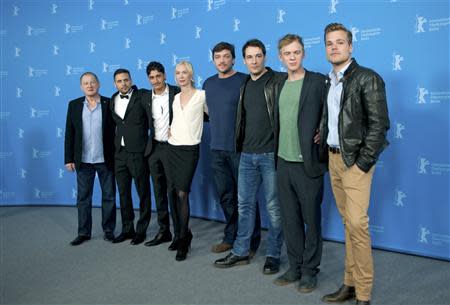Afghan war movie probes German historical angst, self-image
By Gareth Jones BERLIN (Reuters) - Frustration with a lack of open discussion in Germany over its involvement in Afghanistan and over Berlin's treatment of Afghans helping its troops there spurred the making of the film "Inbetween Worlds" by director Feo Aladag. The movie's premiere on Tuesday at the Berlin International Film Festival coincided with signs that Germany - long wary of overseas military entanglements due to its Nazi past - is becoming keener to play a more active global role in keeping with its wealth and size. The film, whose German title is "Zwischen Welten", provides a very German perspective on the Afghan conflict and on the gulf in perceptions and expectations dividing the people of the poor central Asian nation and the Westerners trying to help it. Aladag recounted how irked she had felt on seeing a picture of a German soldier in full combat gear serving in Afghanistan who was clearly there "not just to build bridges". "Germany is doing this now, so why have we seen no feature films about soldiers fighting or dying in combat? ... We have to get a handle on this and be allowed to tell stories about it," she told a news conference. "I was also irritated by the way German politics deals with our local helpers working for ISAF (the NATO mission in Afghanistan). I thought the way they were being treated was unfair," she said, referring to Germany's reluctance to grant visas to Afghans whose work puts their own lives in danger. Despite having peacekeepers deployed today in various overseas missions, Germany still feels constrained by history and prefers to emphasize the humanitarian responsibilities of its troops, who operate under restrictive rules of engagement. "Inbetween Worlds" focuses on the relationship between German commander Jesper, played by Ronald Zehrfeld, and a young Afghan interpreter, Tarik, after their unit is sent to a remote village to protect it against Taliban insurgents. Jesper, whose brother was killed while also serving in Afghanistan, defies orders to rush Tarik's sister to hospital after she is shot by gunmen who view her and her brother as traitors for helping the foreign troops. QUESTION OF CONSCIENCE Aladag said her film, one of four German movies competing along with 16 others for the festival's Golden Bear award, was focused on how the conflict affects the individuals involved and how they struggle with their consciences in making their decisions, not on the political rights and wrongs of the war. "While researching for the film, I found out that German soldiers when taking their oath must say they are committed to their own conscience, which is understandable in the context of Germany history. It is not just a chain of orders," she said. "I think this is an essential point... I am interested in how it tears people apart. If you have a brother, or a friend or son who dies in combat... you try to seek meaning in everything," said Aladag, who is Austrian. Actor Zehrfeld said he hoped the film would stimulate more thinking and discussion in Germany and more widely in Europe about Afghanistan, adding that he had been very ignorant of the realities in the country before taking on the role of Jesper. "(Germany's) parliament gave a mandate to this mission, but people come back from serving there and they are different to how they were when they left," he said. "We need to discuss these things and the film can help bridge the gap," he said. "Germany is a strong exporting nation, we also want a permanent seat on the United Nations Security Council. At the same time, we always want to have this helping attitude. People don't understand how inter-connected all these things are." Germany now has about 3,000 troops in the ISAF mission and they are due to come home by the end of 2014 as NATO hands over full responsibility for security to Afghan forces. (Editing by Mark Heinrich)





